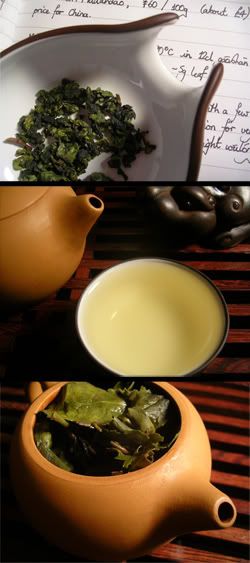If you have a decent tieguanyin that's available from Internet vendors, I'd appreciate your recommendation.
 From Lei's hometown, this tea is 60 RMB / 100g - around £4 ($8). It doesn't sound too terrifically dear, but given the low rural prices from where it came, it's relatively expensive. Very expensive, for a 2007 anything in Lei's hometown, in fact. This forms a fairly strong prior assumption about the tea's quality in my mind, which I try to temporarily dispel for the purposes of unbiased tasting.
From Lei's hometown, this tea is 60 RMB / 100g - around £4 ($8). It doesn't sound too terrifically dear, but given the low rural prices from where it came, it's relatively expensive. Very expensive, for a 2007 anything in Lei's hometown, in fact. This forms a fairly strong prior assumption about the tea's quality in my mind, which I try to temporarily dispel for the purposes of unbiased tasting.Caledonian Springs @ 90C in 10cl qingxiang wulong pot; 1 rinse; ~5g leaf
Dry leaf:
Loose, heavy spheres of tea - not too tight, with a few fragments evident. Super green, almost too green, fitting the fashion for light roasting. The aroma is bright and energetic - typical tieguanyin.
12s, 10s, 12s, 14s, 15s, 16s, 18s, 20s:
This is a seriously tenacious wulong - as you can no doubt tell from the infusion times.
The soup is very clean and clear - a light yellow-green, like a dessert wine.
The first few breaths from the wenxiangbei remind me how much I miss good tieguanyin. Those first sniffs are distant, full, beautiful - buttery, lightly spicy, becoming ever sweeter as they fade. It's easy to see why the opening aroma of qingxiang wulong is so popular.
This tea is rather unusual: each infusion was almost perfectly brewed. The balance of flavour, aroma and texture is just right: not too sour, not too sweet, not too strong, not too vapid. Spot on. I'm sure it's just a sociable leaf, rather than anything to do with my efforts.
Oiliness abound, the pleasing and typical almost almond nuttiness of tieguanyin sits seemingly forever in the nose. Great stuff.
One remarkable quality of this particular tea is its ability to pass through the mouth almost without resistance. It reminds me of an old Daoist line, in which we are told to walk lightly on the earth, leaving no impression. This tea does exactly that: the liquid feels like an invisible medium, intended only for the transmission of flavour and aroma. The actual characteristics of the fluid are almost undetectable.
Swilling it around the mouth... it's an odd sensation - one to keep an eye open for in future teas. [Subsequent brewing sessions revealed the same interesting phenomenon.]
I breath the tea deeply into my dantian, and wonder how this tieguanyin can stand more than eight infusions.
Wet leaves:
Thick and tough, they are entirely unexpected given the almost ethereal qualities of the soup. It is quite surprising that such robust, almost untearable leaves, could result in a tea quite so gentle and pleasant.
Overall:
Sadly, we have just 100g of this tea. Perhaps that's a good thing, as it will oblige me to explore other tieguanyin out there, rather than sticking to one favourite.
Robust, enduring, and for the first few infusions at least, truly lovely.

5 comments:
recommendations:
i tend to like high-fired tieguanyin, and have found stephane's (teamasters) to be very good.
guang (hou de) has a "new" aged tgy that looks excellent, but i haven't yet had the opportunity to try it.
mike
David, you might want to check out the tieguanyin they have at Jing Tea Shop. I didn't like it because it was too vegetal, but I think most people like that about really green tieguanyins. I remember the liquor being very thick, and that's what I enjoyed best about it.
I; taste, drink and acquire a fair amount of tieguanyin, from many sources.
I have found; “Visually Better Quality”, with better pedigree, leaves do not necessarily win side by side taste tests. For me, in China, TGY is a safe tea to order in restaurants. Most do a good/fair job and the tea compliments the foods I eat, Hunan ,HOT/VERY hot, foods.
I second Dustin's recommendation. I'm not a big TGY drinker, but I tried a sample of one from Jing Tea Shop (the Hong Xin) I thought was interesting.
Four recommendations from four respected wulong consumers - good stuff! I've added each recommendation to my lists for Jing, Houde, and Teamasters - thanks, all.
John - I'm not a great expert on Hunan food, but Lei and I spent most of our time in Chongqing eating our way through the local supplies. :)
Getting a decent huoguo in England is a tricky affair...
Toodlepip all,
Hobbes
Post a Comment